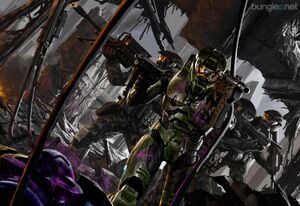Naval Special Warfare Command (NAVSPECWARCOM) is the special forces task command of the UNSC Navy. The organisation is one of three such commands within UNSC Naval Command, alongside Naval Logistical Operations Command (NAVLOGCOM) and Fleet Command (FLEETCOM);[1][2] they are charged with the oversight, training, and equipping of special forces personnel who operate in support of space operations conducted by the United Nations Space Command.[3][4]
NAVSPECWARCOM's counterpart within Unified Ground Command is Unified Special Warfare Command (UNISPECWARCOM).
StructureEdit
NAVSPECWAR is a small and culturally distinct part of the Navy, when compared to its larger counterparts.[4] Due to this, it frequently works with (and under) the other task commands to ensure smooth operation. For example, UNSC FLEETCOM's Special Operations Command is considered the parent organisation for NAVSPECWARCOM.[5]
Edit
Naval Special Warfare Group One was a unit employed during the Insurrection, consisting of ORION Project candidates operating in the field. It consisted of numerous sniper teams who performed a number of targeted assassinations during Operation: KALEIDOSCOPE, with Avery Johnson serving as part of sniper team A as the shooter.[6]
Edit
Naval Special Weapons Operations (NAVSPECWEP or NAVSPECWEAP[7]) is one of the operating groups under NAVSPECWARCOM, and seems to hold operational authority over most of the navy's special forces. Despite this, they answer to both NAVCOM and UNICOM, with UNICOM retaining most oversight of special warfare personnel in field operations.[1][2] This includes the SPARTAN-IIs[1][2][8] and the Orbital Drop Shock Troopers.[9][10]
NAVSPECWEP also appears to operate some form of non-ODST, non-Spartan special forces unit consisting of UNSC Navy personnel such as Franklin Mendez.[11][12] Naval special forces tend to prefer the use of the Model 52 Navy combat knife,[13] alongside black body suits.[14]
In the Post-Covenant War conflicts, NAVSPECWAR (alongside UNISPECWARCOM) assumes operational authority over Spartan Operations division personnel assigned to work under them. In these cases, administrative authority of the Spartans is retained under the Spartan branch, but NAVSPECWAR commanders are given tactical discretion on how to use them.[15] Spartans under NAVCOM assignment will often work closely with ODST strike teams in a similar capacity to UNICOM's Army Rangers.[16] Spartan-II personnel such as those of Blue Team remain under NAVSPECWARCOM administrative control. As such, they retain their naval ranks as opposed to the newer Spartan Operations structure.[17][18]
Production notesEdit
There are a number of inconsistencies relating to the depiction of the UNSC Navy's special forces command, most of which dating back to the original releases of the novels Halo: The Fall of Reach and Halo: Ghosts of Onyx in the early 2000s prior to the release of more dedicated sourcebooks to clarify the matter. In these novels, Eric Nylund seems to depict Naval Special Weapons as a department of the Office of Naval Intelligence's Section Three;
- "Orders that came directly from NavSpecWeap, Section Three.[19]"
- "He had received every piece of equipment he had requested from NavSpecWep Section Three.[20]"
It is unclear how this would fit into the UNSC as defined in more modern media releases, in which ONI is a more distinctly defined department of the UNSC.
SourcesEdit
- ^ a b c Halo Encyclopedia (2009 edition), page 62-63
- ^ a b c Halo Encyclopedia (2009 edition), page 64-65
- ^ Halo: Official Spartan Field Manual, page 125
- ^ a b Halo Encyclopedia (2022 edition), page 62
- ^ Halo: The Fall of Reach, chapter 25: "After the meeting, a new mandate had become the official secret policy of Fleet Command’s Special Operations Command—the parent organization for Naval Special Warfare, the Spartans’ service branch."
- ^ a b Halo Graphic Novel: Page 122
- ^ Halo: The Fall of Reach, chapter 20
- ^ Halo: The Essential Visual Guide, page 121
- ^ Bungie.net, Halo 3 ODST : Field Guide - ODST (Retrieved on May 25, 2013) [local archive] [external archive]
- ^ Halo: The Essential Visual Guide, page 131
- ^ Halo Waypoint, Franklin Mendez (Retrieved on Nov 3, 2015) [archive]
- ^ Halo Encyclopedia (2022 edition), page 106
- ^ Halo Infinite, Armor Hall: TAC/Model 52 Navy Knife description "Naval special forces like to walk softly and carry a big knife."
- ^ Halo: First Strike, chapter 28: During this scene, Fred is referring to the Spartans' mission to capture Robert Watts in 2525. "“Yes, sir,” Fred answered. “We just didn’t have MJOLNIR armor or the advanced weaponry we have today. We looked like any other NavSpecWar team.”"
- ^ Halo Encyclopedia (2022 edition), page 74
- ^ Halo Encyclopedia (2022 edition), page 65
- ^ Halo 5: Guardians: Limited Edition, Spartan Locke's Classified Orders
- ^ Halo Waypoint Forums, John-117 is no longer blue leader (Retrieved on Dec 29, 2019) [local archive] [external archive]
- ^ Halo: The Fall of Reach, chapter 24
- ^ Halo: Ghosts of Onyx, chapter 6

